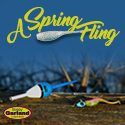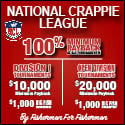This is what Steve McAdams has to say about it and it makes sence to me
spawning time may vary from year to year and several variables play a key role in when and where the annual ritual takes place. Even on your favorite reservoir peak spawning sometimes varies from one section of the lake to the other.
Reasons for the variation are weather conditions, watercolor (turbidity), and surface temperature. Generally speaking, crappie prefer the temperature range of 62 to 66 degrees for active spawning but there are times when a later spawn might occur due to drastic changes in lake levels or adverse effects of cold fronts that push the time line back.
In many northern lakes black crappie spawn in cooler temperatures and clear water while white crappie in the south and Midwest often choose warm conditions and dingy watercolor before dropping their eggs around structure.
Drastic changes in lake levels can often throw the fish off their routine too. Overnight cold fronts that cause quick dips in surface temps are other hurdles. Sometimes, the fish are up on the banks and ready to spawn only to back off and wait for ideal conditions to return. That can mean a delay ranging from a day or two to even a week.
In large lakes fish may spawn a week earlier in a shallow bay or in large basin where dingy water warms quickly. Down the lake where deep and clear conditions exist might see the spawn trailing the shallow end by several days.
Kentucky Lake is a prime example as the upper Big Sandy portion of the lake in perhaps the first sector to see active spawning take place.
Dingy water causes the fish to seek shallow depths as the sunlight is filtered by muddy water and the fish head to shoreline habitat as a result. This situation is often in favor of anglers who love to fish the visible cover and stalk the stickups with shallow presentations of jigs and live minnows.
Adverse conditions like cold fronts and falling lake stages can pull fish off the bed and sometimes cause them to reabsorb their eggs, resulting in a lost or inferior spawning year class. Yet some fish will make a second attempt and try to spawn several weeks after the typical peak period. Perhaps it’s Mother Nature’s way of making sure a few fish sustain the species.
That’s why you’ll hear anglers at the cleaning station talk about crappie still sporting their eggs long after the peak spring phase has passed. Not all fish spawn at the same time so nature is smart and doesn’t put all her eggs in the same basket at the same time.
Some key indicators of peak spawning can be observed if you’ll watch the color of the male crappie, for example. The height of spawning is underway when the males turn a deep, dark purple, which is the influence of hormonal changes.
The color transition takes place over a two to three week period and you’ll see early color phases in the males, which is a sure sign things are underway on your favorite lake. You can also monitor surface temperature on your LCR unit or temp gauge and pay attention to the variation between main lake areas and secondary coves.
Crappie will often stage in the main lake zones where feeder creeks provide a highway to and from spawning areas. So, remember that you can capitalize on the habits and movement of prespawn fish or follow them as they stair-step their route to their annual bedding locales.
Yet the element of surprise is still on the side of the fish and Mother Nature. No one can predict the weather changes or changing lake levels. Trends do occur and certain weeks of spring have a tradition of being peak fishing times but the best time to go is still “whenever you can”.
The fish don’t seem to care how far you drive or how much you spend to pursue crappie fishing’s finest hour. They don’t know you plan your vacation months in advance. Respect is hard to come by when the conditions turn against you and you’re a long way from home.
No one can predict the peak-spawning week each spring, although here in the Tennessee portion of Kentucky Lake the first two weeks of April are considered prime time. Your best bet is to hope for the best and prepare for the worst. Pack along suntan lotion and a winter coat in the same bag. With spring crappie fishing you never know which one you’ll have to use!


 Likes:
Likes:  Thanks:
Thanks:  HaHa:
HaHa: 

 Reply With Quote
Reply With Quote















